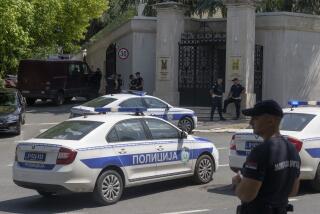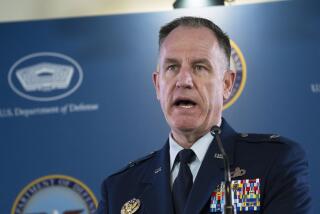U.S. Soldier Stabbed With Sickle in Bosnia
- Share via
SARAJEVO, Bosnia-Herzegovina — An American soldier was stabbed in the back and slightly injured by a sickle-wielding attacker Wednesday in the Serb-controlled portion of Bosnia, and the third explosion in four days targeted foreign peacekeepers, officials said.
The incidents were part of a spate of harassment and threats against international and NATO personnel that has followed the slaying of a Bosnian Serb war crimes suspect and the capture of another by British and U.S. troops last week.
Several international organizations have curtailed their activities in Bosnia-Herzegovina as a result of the threats, and the U.S. State Department issued a travel advisory. But overall, the incidents have fallen far short of the deadly reprisals that some had predicted would follow any attempt to capture war crimes suspects.
Sources said Bosnian Serb leaders told key NATO and other international officials that they would keep a lid on popular anger over the arrest and slaying--this time. But the Serbian officials warned that another attempt to go after war crimes suspects would trigger violence and possible bloodshed.
Whether the largely demoralized Bosnian Serb population--increasingly impoverished and angry at its rulers--would in fact rise up against international peacekeepers is not clear. The Bosnian Serb leadership retains control over television and a well-armed police force and is capable of whipping up a fair amount of mischief, analysts say.
“It doesn’t have to be massive,” one international official said. “They can make things awfully uncomfortable with a few incidents here and there.”
At the same time, North Atlantic Treaty Organization officials said they made it clear to the Bosnian Serb leaders that serious acts of retaliation risk military punishment.
“They know where we stand,” said U.S. Army Col. Steve Rausch, senior spokesman for the NATO mission in Bosnia. “There is a certain amount of deterrence by their knowing our standards. . . . We’ve got plenty of military power.”
Thus far, the backlash has seemed relatively minor. Early Wednesday, a grenade damaged a BMW belonging to a member of the United Nations force monitoring police in the northern Bosnian Serb city of Prijedor. The former police chief of Prijedor, Simo Drljaca, was killed last week by NATO troops attempting to apprehend him as a war crimes suspect. NATO said he resisted arrest.
A vehicle and housing used by the Organization for Security and Cooperation in Europe, or OSCE, which is in charge of upcoming elections, also were damaged by explosions Sunday and Monday.
Anti-West posters and fliers containing death threats also appeared in several cities. “Somalia was to [sic] gentle,” reads one; “Head for head,” says another.
Bosnian Serb police were spotted depositing some of the threatening pamphlets at a U.N. police compound in the city of Doboj over the weekend, a U.N. official said.
About 1:30 a.m. Wednesday, a U.S. soldier living off-base with about eight other Americans in the Serb-held city of Vlasenica was attacked with a sickle by an unidentified man, U.S. Army officials said. The soldier, a member of a specialized observer team, received a 3-inch puncture to the back, was treated and released.
The U.S. Army refused to release the soldier’s name or any other details.
It was the first serious attack on a U.S. soldier in Bosnia since the peacekeeping mission began in December 1995.
Momcilo Krajisnik, the Bosnian Serb member of Bosnia’s three-person presidency and a close ally of indicted war crimes suspect Radovan Karadzic, has publicly urged calm. However, Bosnian Serb television--which is controlled by Krajisnik and Karadzic--also has made nightly broadcasts that diplomats said are clearly aimed at inflaming public sentiment.
Officials of the major international agencies working in Bosnia said they have restricted the movements of their personnel in the Bosnian Serb half of the country, but that they are continuing to perform their duties.
“We have advised everybody to be particularly cautious,” U.N. refugee relief official Kris Janowski said.
More to Read
Sign up for Essential California
The most important California stories and recommendations in your inbox every morning.
You may occasionally receive promotional content from the Los Angeles Times.











